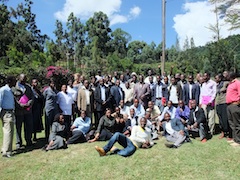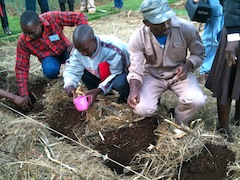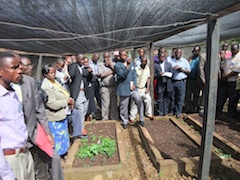| |
|
 |
ARC holds a Farming God's Way workshop in Kenya
October 22, 2012:
 |
 |
 |
Anglican and Catholic faith leaders gather for the Farming God's Way workshop in Kijabe, Kenya |
ARC has held a second successful workshop on a faith-based form of sustainable agriculture, called Farming God's Way, for Christian faith leaders in Kenya.
The workshop, which was delivered by Craig Sorley of Care of Creation Kenya (a Christian organisation dedicated to awakening the Church's responsibility to care for God's Creation), was aimed at members of the Anglican Church in Kenya and the Catholic Church in Kenya.
Nearly 60 faith leaders attended the three-day workshop held earlier this month at Kijabe, approximately one hour north-west of Nairobi on the edge of the Great Rift Valley. The overwhelming majority of participants (80%) rated the workshop as 'excellent' with the remaining 20% describing it as 'very good'.
The workshop was aimed at people of influence in faith communities - particularly those ministering to rural people or to farmers - who would then take what they had learned and promote it within their congregations.
 |
 |
 |
One of the practical sessions: participants learned how to plant under mulch, dig at the right angle, apply the correct amount of fertiliser or manure; and plant the seeds at the correct depth |
Farming God's WayFarming God's Way combines the religious basis for caring for the environment with practical training in sustainable agriculture. Its core principles are similar to those of conservation agriculture which is promoted in Africa as a form of climate-smart agriculture that not only restores degraded land but also increases crop yields - sometimes significantly.
Restoring degraded landIt is based on minimal disturbance of the soil (no tillage), permanent organic cover in the form of mulch, composting and crop rotation. As well as reducing drudgery and labour for smallholder farmers by up to 50%, this farming method nourishes the soil and enables it to retain water much better, which means it’s particularly useful in dry areas.
This conservation farming method was borne out of the American dust bowl of the 1930s when decades of intensive farming, drought and intense wind storms literally blew away the soil.
 |
 |
 |
The group also learned about setting up a tree nursery |
"Conservation agriculture is Farming God's Way without God," says Craig Sorley. "But it's the God part of this picture that really changes attitudes."
Craig Sorley has a demonstration farm at Kijabe where he shows how crops fare under the Farming God’s Way method compared to conventional agriculture.
He recently harvested 89 kilos of potatoes from the Farming God’s Way plot compared to 51 kilos of potatoes from the conventional plot. His bean harvest was even more impressive – three and a half times as much from the Farming God’s Way plot compared to the conventional plot.
“They are planted on the same day, same variety, same amount of small amount of inorganic fertiliser applied and this is all rain-fed agriculture,” he says.
'If we restore the soil, we will bring more food into our families'“The beauty of this is that it’s simple, it’s achievable, you use your own resources in the community – you don’t have to bring in fertilisers and seeds from the outside – it’s just a change in management and a change in commitment to the soil itself. If we restore the soil we will bring more food into our families.”
|
 |
 |
|
|
|
|
|

